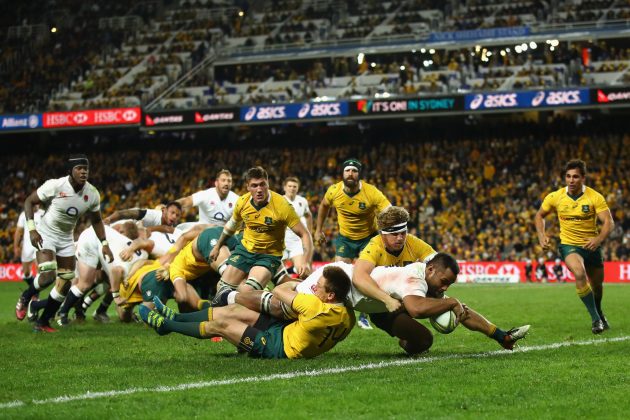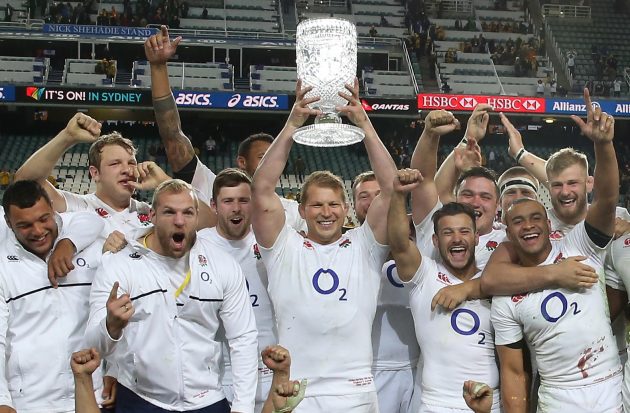After nearly a month of furious action, it's time to get the report card out and mark the performances of the home nations against the Southern Hemisphere
By Alex Shaw
The home nations’ summer tours wrapped up this past weekend and with teams and fans alike are preparing for a few weeks rest and recuperation, the time is ripe to take stock of how each nation performed.
The southern hemisphere is a tough hunting ground for northern hemisphere nations but with a number of encouraging performances over the last month, hope has been rekindled – after a Rugby World Cup in which no Northern Hemisphere side reached the semi-finals – that the gap between the two hemispheres may indeed be closing.
England
The Six Nations Grand Slam winners kept up their incredible run under new head coach Eddie Jones, whitewashing Australia in their three-test series and improving Jones’ record to nine consecutive wins as England head coach. All three games were competitive and compelling tests but few would argue against the fact that England were worthy winners in each and every one of them.

Sensation: The emergence of Maro Itoje has been key to England’s revival
Young leaders such as Maro Itoje and Owen Farrell rose to the fore and once-maligned captain Dylan Hartley was the epitome of consistency and reliability at hooker. Previously slighted flankers Chris Robshaw and James Haskell were at their destructive best, whilst George Ford and Jonathan Joseph also shone and shed the negativity of Bath’s 2015/16 Aviva Premiership campaign.
What may have been most impressive, however, was the fact that England never looked like they hit top gear in Australia and yet they were still able to dispatch the Wallabies with a relative level of comfort. With so many young players in this England team and even more knocking on the door, the potential of where they could go under Jones is a salivating prospect for England rugby fans.

Front foot ball: Billy Vunipola gave England momentum out in Australia
Grade – A*
They might have not quite hit top gear Down Under but recording their first ever series win in Australia is a remarkable achievement. By denying Australia a win in their own backyard, England made a very loud statement to the rest of the rugby world.
Ireland
It’s fair to say that optimism wasn’t a byword for Ireland’s build-up to their tour of South Africa. With so many key players injured and the team coming off the back of a lacklustre Six Nations, there was a feeling that Ireland would do well just to be competitive against the Springboks.
History beckoned for Ireland, however, as they recorded their first ever test match victory in South Africa, defeating the Springboks, 26-20, at Newlands. The result showed that Joe Schmidt’s style can win games in the southern hemisphere, albeit with Ireland playing with a measure more freedom than we have become accustomed to over the last few years.

Class act: Conor Murray scored a vital try in the First Test against the Springboks
Paddy Jackson stepped in well for Jonathan Sexton, assuaging worries that Ian Madigan’s imminent departure for France would leave cover for the Irish fly-half jersey perilously thin. Jack McGrath battled valiantly against a dominant, Tendai Mtawarira-led South African scrum, whilst Jared Payne looked to the manor born in his club position of full-back, rather than the outside centre berth he had been filling at international level previously.
Grade – B

Comeback: Elton Jantjies celebrates as South Africa come from behind to win the Series 2-1
The decision to rest players at altitude for the second test was potentially a very savvy decision from Schmidt but when Ireland failed, on multiple occasions, to overturn a single score deficit towards the end of the third test in Port Elizabeth, it highlighted the missing ability to execute at the most important times, something which northern hemisphere teams often struggle with. Bearing in mind injuries and form, the tour was a reasonable success for Ireland but there will be a real level of frustration that they weren’t able to get over the final hurdle.
Wales
Warren Gatland’s men were always going to be up against it travelling to New Zealand to take on the reigning World Champions and unfortunately there were very few reasons for optimism after Wales were not only beaten 3-0 by the All Blacks, but also dispatched in fairly embarrassing fashion by the Chiefs in a midweek match.

Emergence: Ross Moriarty was one of the positives to come out of a tough tour
The rises to prominence of Ross Moriarty and Liam Williams, who made the most of injuries to Dan Lydiate and Leigh Halfpenny respectively, were certainly the silver linings to a very tough tour, while Taulupe Faletau wouldn’t have looked out of place in a black shirt. Moriarty looked at home against the physical power of the All Blacks and Williams delivered some of Wales’ finest moments in attack, running the ball from deep with incision and no shortage of ambition.
Unfortunately, with a largely experienced and veteran side taken, there weren’t too many opportunities for youngsters or fringe players to push their cases for further inclusion and the tour really underlined just how big the gulf is between the two sides. The 40-7 loss to the Chiefs will particularly hurt, as the Super Rugby side were missing seven or eight of their first-choice players and still shredded Wales’ 2nd XV with consummate ease.

Runaway: Wales had a heavy loss against the Chiefs
Grade – C-
The form of Moriarty and Williams was impressive, as was Wales’ ability to stay competitive for 40-50 minutes but based on their 80 minute performances across all three tests and the midweek game against the Chiefs, the tour was about three or four bridges too far for Wales. To be brutally honest, New Zealand never looked like they hit top gear.
Scotland
Whilst the other home nations embarked on epic three-test tours of the powerhouses of southern hemisphere rugby, Scotland scraped a two-test series with Japan. That famous game in Brighton last year taught us all not to underestimate the Brave Blossoms but with Scotland taking an almost full-strength team to the Far East, there was an expectation they would return victorious.

Consistent: Jonny Gray is ever improving at the Scotland coalface
A 26-13 victory followed up by a 26-19 win a week later ensured that Scotland would do just that but neither performance filled fans with much optimism as they continue to build under Vern Cotter. WP Nel impressed at the coal face, Jonny Gray’s march to the top gained impetuous and John Hardie excelled with his work rate, but it was a laboured performance elsewhere from the Scots.
Cotter surprised many by leaving a number of standout talents, including capped tighthead Zander Fagerson, in the U20 set-up for the summer and given the resources Scotland took with them to Japan, it is fair to say that they underperformed. This was not a developmental tour for Scotland and they failed to put down a marker with their efforts.

Handful: WP Nel was a powerful presence in the tight and loose
Grade – C+
You cannot be too critical over a tour which saw Scotland win both of their games but there was no improvement in the level of Scotland’s play that we saw at the Six Nations and there were few reasons, either, to think that that improvement is just around the corner. The potential is there in this Scotland team but as of right now, they seem unable to unlock it.





